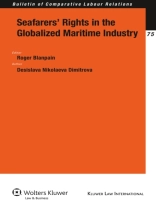The enormous technological, financial, and structural changes of recent decades have revolutionized the international shipping industry, bringing about lower freight rates, shorter time in port and fast turnarounds, reduction in crew size, employment of cheap labour from developing countries, avoidance of national regulations and taxes, and diminished living and working standards on board. Exploitation of seafarers has always existed, but now it has become more common and frequent. Shipowners can cut costs in various ways, but the most profitable and easiest to achieve are those at the expense of labour costs, in particular costs for maintaining proper living conditions on board the ship. This bulletin examines in detail the structure of the shipping industry, focusing on problems concerning the working and living conditions of seafarers on board merchant ships serving the global sea transport system. Exploring all levels of maritime policymaking on a global and European level, the author analyses seafarers’ rights in the light of international enforcement mechanisms and particularly in the light of the recent ILO Maritime Labour Convention. He also considers relevant case law, as well as advisory opinions and policy statements from various pertinent agencies, especially in the EU context.. Among the issues raised and discussed in depth in relation to their effect on seafarers’ labour standards are the following: ship manning companies; illicit crewing agencies; flags of convenience; hours of work and rest; wages; occupational health and safety; accommodation, food, water, and catering; recreational facilities; filing of grievance; and port controls. The author shows that, expansion and progress of the maritime industry notwithstanding, there is a great need for effective enforcement mechanisms in this area. This is the first detailed analysis to connect the working and living conditions of seafarers with international, supranational, and national maritime legislation. A giant step towards establishing a global monitoring system to enforce international maritime conventions regarding seafarers’ labour standards, it is sure to make an important contribution to both international labour and employment law and the law of the sea.
Desislava Nikolaeva Dimitrova
Seafarers’ Rights in the Globalized Maritime Industry [PDF ebook]
Seafarers’ Rights in the Globalized Maritime Industry [PDF ebook]
Kup ten ebook, a 1 kolejny otrzymasz GRATIS!
Język Angielski ● Format PDF ● Strony 184 ● ISBN 9789041155207 ● Redaktor Roger Blanpain ● Wydawca Wolters Kluwer ● Opublikowany 2010 ● Do pobrania 3 czasy ● Waluta EUR ● ID 8092289 ● Ochrona przed kopiowaniem Adobe DRM
Wymaga czytnika ebooków obsługującego DRM












